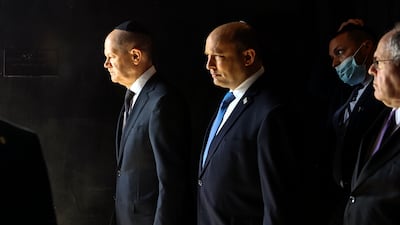German Chancellor Olaf Scholz has ruled out military intervention in Ukraine, after Berlin made historic changes to its foreign policy over Russia’s invasion of eastern Europe.
“It is not to be underestimated how dangerous this conflict is, and that is why it is clear that there will be no military intervention on our part,” he said on Wednesday during his first visit to Israel as chancellor.
“Nato will not do that, nor will anybody else in this situation. This would be a mistake,” Mr Scholz said as he stood next to his Israeli counterpart, Naftali Bennett.
Ukrainian President Volodymyr Zelenskyy has called on global powers to impose a no-fly zone to halt Russia’s bombardment of his country.
World leaders have ruled out such a step, saying it could ignite a broader war.
Russia’s invasion has prompted Germany to send weaponry to Ukraine, breaking with Berlin’s decades-long policy against exporting arms to conflict zones.
The EU and the US, Israel’s top ally, have also approved military aid for Ukraine, as have other countries.
Israel, which has warm relations with Moscow, has sent humanitarian aid including medical supplies and sleeping bags.
On Wednesday, the UN said more than 830,000 people had fled Ukraine in the past six days.
Mr Bennett called for an “immediate ceasefire” in Ukraine, where one Israeli citizen was killed this week.
“We have a very measured and responsible policy,” he said.
Mr Bennett has not criticised Russia for its military assault.
“[Our] goal is to both help the Ukrainian people and do what we can to help alleviate some of the pressures and the consequences of this horrific situation.”
Since the start of the war, the Israeli Prime Minister has spoken to both Ukraine’s President Zelenskyy and Russian President Vladimir Putin.
During the German chancellor’s one-night stay in Israel, he also visited the Yad Vashem Holocaust memorial and met Israeli Foreign Minister Yair Lapid.
Agencies contributed to this report


















































